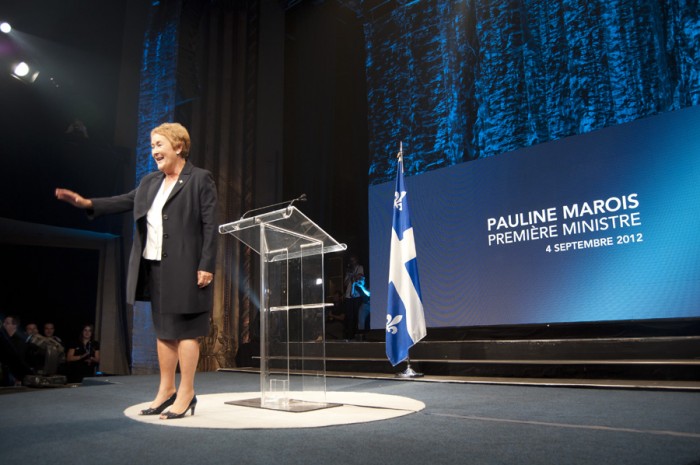The Parti Québécois (PQ) won 54 seats last night in a tightly contested election called in August by the Parti Liberal de Québec (PLQ). The results were announced to an ecstatic crowd of supporters, gathered at the party’s election night rally at Metropolis in downtown Montreal.
As the results rolled in after 8 p.m., Pauline Marois, leader of the PQ, was officially confirmed the first female premier of Quebec. The announcement was followed by a series of televised speeches given by heads of the other parties from their bases. The evening was to conclude with Marois’ victory speech at the Metropolis at 11:30 p.m.
Two tragic shootings, one fatal.
The night’s festivities were marred by a tragic turn of events. Around midnight, a gunman burst into the venue and fatally shot one bystander, critically wounding another. He fired several shots outside of the venue’s back door. The victim was an electrical technician employed by Metropolis. A contract bus driver for the PQ remains in critical condition but is alive.
According to the Montreal police’s Twitter account, the suspect is reported to have cried “Les anglais se réveillent!” (The English are rising) before opening fire on the crowd. No motives have been assigned to the shooting, as the crime is still under investigation.
In an interview with the Tribune, political science professor Jacob Levy de-emphasized the shooting as signaling a trend in Quebec society.
“I think one shouldn’t read too much into something like that,” Levy said. “It tends to be a mistake to read into one disturbed person’s actions as a sign of the broader times. The killer was clearly motivated by something political and probably something intercommunal, but that doesn’t mean that other Anglos … are in a state of high agitation. That may be the case, but this event doesn’t show it.”
Liberals remain, under a PQ minority
The race was hotly contested, with the PQ defeating the Liberal Party by a margin of .73 percentage points of the popular vote. The Coalition Avenir Québec made significant gains for a new party, and Québec Solidaire doubled their seats in the National Assembly.
Though the Liberals won 50 seats, the head of the party, Jean Charest, lost his Sherbrooke seat to PQ Member of the National Assembly (MNA) Serge Cardin. The loss in Sherbrooke marks the end of Charest’s 28-year career, as he resigned on Wednesday from his position as leader of the Liberal Party.
Despite Charest’s defeat, the Liberals won more seats than suggested by polls prior to the election.
“To my surprise, [the Liberals] are alive and kicking,” Levy said. “They are probably better off without Charest, and are able to start rebuilding and reorganizing effective tomorrow … [for] the election that we’ll probably have in a year and a half or so.”
Indeed, if the PQ cannot find common ground with the opposition parties, this parliament could be short lived. Quebec’s most recent minority government, led by Charest, lasted just 17 months. Prospects seem contingent on collaboration and leadership.
PQ MNA Bernard Drainville was optimistic about the election’s prospects for his party.
“For the moment, for tonight, what we know is that the Quebeckers voted to remove the Liberals and put them at the door,” Drainville said, addressing the Tribune and other members of the press.

Tuition and Bill 78
The PQ has already begun to make policy changes that distinguish them from the Liberals. At her first press conference as Premier-Elect on Wednesday, Marois announced that one of the new government’s first priorities would be to freeze university tuition and to repeal Bill 78, also known as Law 12. The announcement comes as a response to student strikes and demonstrations, which were one of the causes for the late-summer election, and has left some students hopeful for the future of Quebec education.
“It sounds like there is a lot of relief from students—from seeing things on social media and Twitter—that the announcement has come so early,” SSMU VP External Robin Reid-Fraser said. “[But] obviously students are going to keep paying attention to what happens after.”
“If there’s a minor possibility of [resolving the tuition dispute], we’ll do it ….” PQ member Jean-François Lisée told the Tribune in French. “We’re the ones who won … so we’ll do our best to deliver 100 per cent of our promises.”
It remains to be seen whether the rest of the National Assembly will allow these changes, although the PQ might try to use an order-in-council, a governmental decree, to put them into effect. The newly elected premier also told the press that her party would implement changes to Bill 101, Quebec’s controversial language law, such as limiting access to anglophone CEGEPs.
“Quebeckers have made their choice, and we will respect the choice and work with all the other elected MNA in Quebec,” Marois said in her election night address in French.
—With files from Erica Friesen and Carolina Millán Ronchetti.









